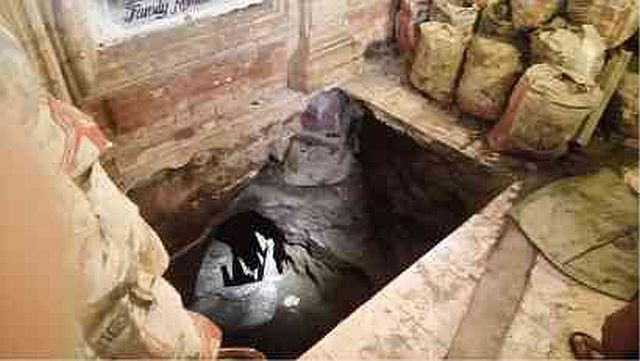
Suspected treasure hunters believed to be sanctioned by San Joaquin parish priest Nelson Silvela dug this 18.29-meter-deep (60-foot-deep) hole inside Campo Santo in San Joaquin, Iloilo province. The photo was taken from the Facebook page of Nenet Secondes Daulu. (INQUIRER)
Parishioners wept during Mass on Feb. 28 when it was announced that their priest, Nelson Silvela, had been relieved from his post by the Jaro Archdiocese in Iloilo.
“They were still in pain but at the same time relieved,” said Fr. Joselito Sarabia, a native of the town and director of St. Vincent Seminary in Quezon City.
Two days before Silvela’s relief, police filed a criminal complaint against him and 10 men believed to be treasure seekers for digging a 18.29-meter-deep (60-foot-deep) hole under Campo Santo, a 19th century-mortuary chapel at the municipal cemetery in San Joaquin, Iloilo province.
The sites are among the cultural properties declared national cultural treasures by the National Museum of the Philippines.
Cultural properties “possess outstanding historical, cultural, artistic and/or scientific value, which is highly significant and important to the country.”
Police arrested the 10 men on the night of Feb. 24 while digging inside the chapel after a resident reported their presence there. Witnesses, including a barangay chair and the cemetery caretaker, pointed to Silvela as the one who supported or directed the activities.
“Father Nelson told me that if anyone asked about the digging, I would refer the questions to him,” the cemetery caretaker, Baltazar Savari, said in Hiligaynon.
The priest has not been seen since he left the parish a few days after the workers were arrested. He has not issued any statement or responded to phone calls and text messages from the Inquirer.
Archbishop Angel Lagdameo approved Silvela’s “indefinite” leave of absence, according to a statement issued by the Jaro Archdiocese. He appointed Fr. Junnick Territorio, a San Joaquin native, parish administrator.
Police filed the complaint against Silvela and the workers in the Iloilo Provincial Prosecutor’s Office for violation of the National Cultural Heritage Act of 2009 (Republic Act No. 10066). The penalty includes at least 10 years imprisonment or a fine of P200,000, or both.
Campo Santo is a source of pride of residents of San Joaquin, a town of about 50,000 and 54 kilometers from Iloilo City. It is also a top tourist attraction in Iloilo, according to the municipal tourism officer, Arlene Alunan.
Fr. Mariano Vamba, the last Augustinian parish priest of the town, initiated the construction of the cemetery and the hexagonal-shape mortuary chapel in 1892.
The Baroque-style chapel is on top of the concrete staircase from the lower level of the cemetery. The walls are made of coral stones and red bricks and its interior adorned with carvings of flowers and leaves.
Buried in the walls are the remains of priests and members of prominent families of San Joaquin.
The arrested workers said they did not find any treasure, claiming that they were hired only days earlier to backfill the hole. But the cemetery caretaker, Savari, said some of them had earlier told him they found gold nuggets.
The claims could not be verified as the detainees gave limited information to the police. Some initially gave false names to the investigators.
Sarabia said the treasure hunters might have assumed that precious items or treasures could be buried under Campo Santo along with the remains of those belonging to prominent families.
Msgr. Joemarie Delgado, director of the Jaro Archdiocesan Commission on Social Communications, said Silvela would undergo administrative proceedings in the archdiocese.
“We will help in upholding the law. If the law has been violated, we will cooperate with the justice system,” he said.
Disclaimer: The comments uploaded on this site do not necessarily represent or reflect the views of management and owner of Cebudailynews. We reserve the right to exclude comments that we deem to be inconsistent with our editorial standards.
